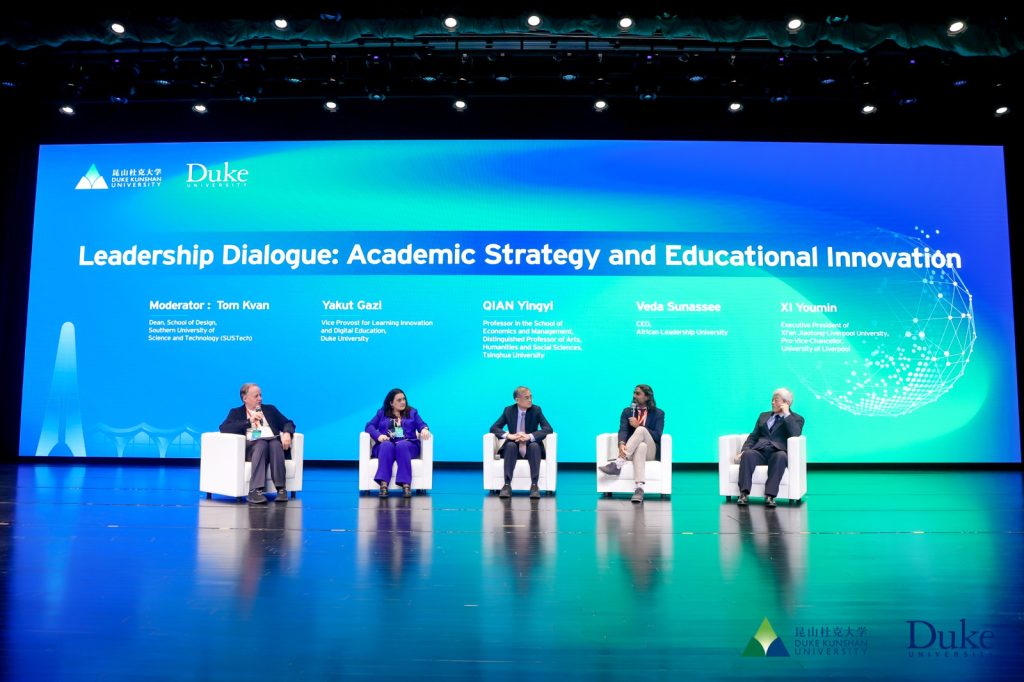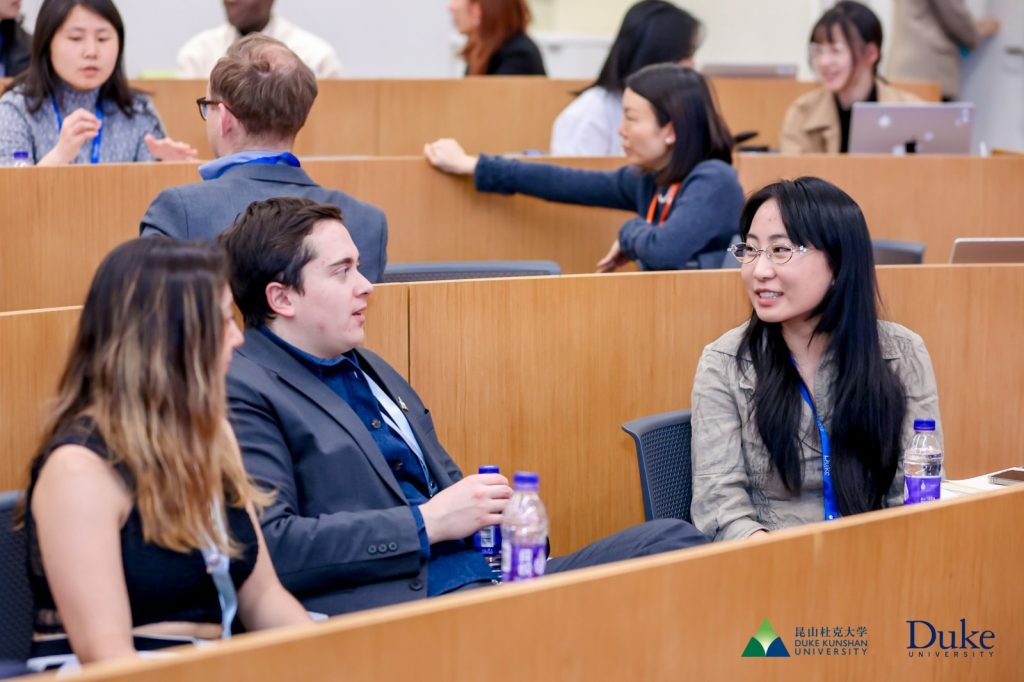
On March 21, 2025, the Institute for Global Higher Education (IGHE) at Duke Kunshan University (DKU) hosted the International Educational Innovation Forum, a day of meaningful conversations about the future of higher education. The event brought students into direct dialogue with educators and academic leaders from around the world. Representatives from established institutions including Duke, Harvard, NC State, UC Berkeley, Wuhan University, Peking University, Tsinghua University, York University, Pomona College, as well as new and innovative universities such as Xi’an Jiaotong-Liverpool University, West Lake University, Hong Kong University of Science and Technology at Guangzhou and the African Leadership University came together to exchange ideas, share perspectives, and consider how education can evolve to meet the needs of a changing world.

A highlight of the forum was the keynote by Dr. Shi Yigong, President of Westlake University, and the panel on “Mapping the Future of Educational Innovation in an AI World”. These sessions invited students to consider how technology is influencing teaching and learning.
Reflecting on the keynote, Yunhao Pan ’28 said: “Dr. Shi stressed the help AI gave him in his life with his personal experience, and stressed the strong development potential of AI in the future, which is in line with my experience of AI in life. I deeply agree with Shi Yigong’s view, and it also makes me reflect on how to use AI correctly and appropriately.”
“There are more investigations and experiments currently for the uses of AI than is widely discussed.” Added Daniela Torres Medina ’27.
This forum also marked the official launch of the IGHE in China, building on the momentum of its first global gathering—the “New Global Universities Summit” held in Washington, D.C. in June 2024. The summit convened founding leaders of emerging universities around the world to reflect on their shared challenges and aspirations. What started as a founder-focused dialogue has since expanded to include students as key contributors to this evolving conversation.
The forum opened up meaningful space for undergraduate students at DKU to engage directly with academic leaders—asking questions, offering perspectives, and exploring complex topics such as interdisciplinary learning, cross-cultural education, pedagogy, and the role of AI together. Students heard firsthand how different communities approach the same core question: What should education look like today? It reinforced the idea that education should be inclusive and shaped through open dialogue with those it serves.
Malak Waleed Abed Alhaq Musabeh ’27 reflected on the value of the experience:
“I found it very valuable to see people with expertise in different fields give their opinions on education, it helped me think of different ways we can address education as a whole.”

What stands out for this event is that students are invited to take leadership roles in contributing to the kind of higher education they experience. A student-led session by DKU undergraduates Tianyu Xu ’25 and Yiyang Zhang ’25 provided space for student voices to take center stage. Drawing from their experiences at DKU, they shared their perspectives on what it means to truly innovate in higher education , generating strong responses from the audience. Tianyu emphasized the need to prepare students for long, evolving careers through systemic innovation, not just curriculum reform, but mindset shifts and structural change. Yiyang then challenged the audience to rethink how we define and measure innovation, and how universities can better integrate research, creativity, and career readiness. Their session underscored that true educational innovation requires reimagining, not just improving the system.
“I really enjoyed the student presentation and panel discussion, where students shared their insights on higher education with DKU examples that are closely related to my experience,” said Yitong Su ’25.“It is great for the forum to dedicate a session specially for the students.”

Throughout the forum, the students played active roles—listening, asking thoughtful questions, and reflecting alongside educators and innovators from institutions around the world. The forum offered a window into current thinking on issues like AI integration, liberal arts in different contexts, and emerging trends in global higher education.
The forum’s break-out panel on “Charting the Frontiers of Interdisciplinary Education in the US and China” offered profound insights into the practical applications of interdisciplinary studies. Participants explored how theoretical knowledge across various fields can be effectively integrated through hands-on experience.
“I gained an insight from professors at Duke University that reshaped how I think about education,” said Sevara Kazimova ’28. “Interdisciplinary understanding doesn’t stem from mastering multiple fields in theory, but from having actual experience in them. A simple concept—but one that opened up something important for me.”
Tianyu Xu ’25 also added: “I figured out different understandings toward interdisciplinary studies in China and the U.S., leading to different practices, pushing me to further think about application of pedagogical innovation in different cultural contexts.”


The forum also emphasized the importance of global perspectives in education. Discussions on education in Africa and its globalization efforts provided valuable insights into cross-cultural educational dynamics.
Beyond formal sessions, what many students found most valuable were the informal moments—conversations over meals, spontaneous exchanges in the hallway, and breakout discussions that encouraged real engagement.
“I felt truly honored to have the opportunity to engage in a thoughtful exchange about education, entrepreneurship, and international perspectives. We discussed the future of overseas study, the employment prospects for students from joint Sino-foreign programs, and the broader direction of educational development. Their insights were not only inspiring but also gave me valuable guidance as both an educator and entrepreneur. As someone who has founded an international education studio, this reinforced my belief in the importance of developing a well-rounded, globally aware curriculum for the next generation.” Avril Gong ’25 shared.
These personal, often spontaneous moments highlighted something essential: education doesn’t just happen in lecture halls. It happens through dialogue, reflection, and connection. For many, this forum was not just an event, but an opportunity to participate in shaping a conversation that continues to grow.

